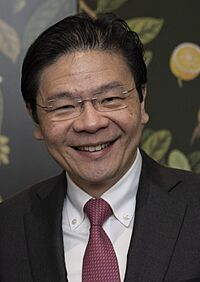Prime Minister of Singapore facts for kids
Quick facts for kids Prime Minister of theRepublic of Singapore |
|
|---|---|

|
|

Coat of arms of Singapore
|
|
| Government of Singapore Prime Minister's Office |
|
| Style |
|
| Abbreviation | PM |
| Residence | Sri Temasek |
| Appointer | President |
| Term length | 5 years, renewable |
| Precursor | Chief Minister of Singapore |
| Inaugural holder | Lee Kuan Yew |
| Formation | 3 June 1959 |
| Deputy | Deputy Prime Minister |
| Salary | S$2,200,000/US$1,641,791 annually (including S$192,500 MP salary) |
The Prime Minister of Singapore is the main leader of the government in Singapore. The President chooses the Prime Minister. This choice is made with the advice of the Cabinet, which is a group of top government ministers. The current Prime Minister is Lawrence Wong, who started his role on May 15, 2024.
Singapore's government works like the Westminster system, which is used in countries like the United Kingdom. This means the Prime Minister needs the support of most members in the Parliament. Usually, the Prime Minister is a member of Parliament (MP). They lead the political party or group of parties that has the most seats in Parliament.
Contents
How the Prime Minister's Role Began
The role of Prime Minister started in 1959. Before that, Singapore had a "Chief Minister." In 1959, Singapore became self-governing, meaning it could make its own decisions. Lee Kuan Yew became the first Prime Minister on June 5, 1959.
When Singapore joined Malaysia in 1963, the title of Prime Minister stayed the same. This was even though Malaysia already had its own Prime Minister for the whole country. Singapore became fully independent in 1965. After this, the Prime Minister's role continued. The President became a ceremonial leader, like a symbol of the country.
In 1991, some changes were made to Singapore's laws. These changes gave the President more power, including the ability to say no to some government decisions. However, the President usually follows the advice of the Cabinet. So, the Prime Minister and the Cabinet still do most of the actual work of running the country.
If the Prime Minister is away or sick, another minister can act as Prime Minister. This person is usually the Deputy Prime Minister or a Senior Minister. The President must approve this temporary appointment.
What the Prime Minister Does
Even though the President has some powers, the Prime Minister leads the Cabinet. This means the Prime Minister is in charge of the daily running of the government. They also make sure government plans are put into action.
As the leader of the main party in Parliament, the Prime Minister helps pass new laws. They also suggest who should be the Speaker of Parliament. The Speaker helps manage Parliament's meetings and law-making plans.
The Prime Minister also chooses the other members of the Cabinet. The President must agree to these choices. The Prime Minister can also change or remove ministers. They also advise the President on other important appointments. These include the Attorney-General and top officials in government ministries.
The Prime Minister can ask the President to declare a state of emergency if needed. They also have power over the Singapore Armed Forces (SAF). This is done through a special council that includes the Minister for Defence and military leaders.
Prime Minister's Residence and Protection
Sri Temasek is the official home for the Prime Minister. However, no Prime Minister has ever lived there. The Istana is usually the Prime Minister's main office. Since 2024, Sri Temasek has been used as the working office. This is because The Istana is being renovated.
The Prime Minister is protected by a special police unit. This unit also protects the President, other ministers, and important visitors from other countries.
Prime Minister's Salary
The Prime Minister's yearly salary package is about S$2.2 million. This includes bonuses. There is no one to decide on a performance bonus for the Prime Minister. So, their bonus is based only on a "National Bonus." They also get money added to their Medisave account for healthcare.
Before 2011, the Prime Minister's salary was S$3.07 million. In 2011, a committee reviewed the salaries of political leaders. After their recommendations, the Prime Minister's salary was reduced by 36%. This also removed their pension. Even with this reduction, Singapore's Prime Minister is still one of the highest-paid political leaders in the world.
List of Prime Ministers of Singapore
- Political parties
People's Action Party (PAP)
| No. | Portrait | Name (Birth–Death) Constituency |
Election | Term of office | Political party | Cabinet | President (Tenure) |
||
|---|---|---|---|---|---|---|---|---|---|
| Took office | Left office | Time in office | |||||||
| 1 | 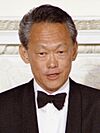 |
Lee Kuan Yew (1923–2015) MP for Tanjong Pagar GRC |
1959 | 5 June 1959 |
28 November 1990 |
31 years, 176 days | PAP | Lee K. I | Elizabeth II Queen of the United Kingdom (1959–1963) |
| Putra of Perlis King of Malaysia (1963–1965) |
|||||||||
| 1963 | Lee K. II | ||||||||
| Yusof Ishak (1965–1970) |
|||||||||
| 1968 | Lee K. III | ||||||||
| Benjamin Sheares (1971–1981) |
|||||||||
| 1972 | Lee K. IV | ||||||||
| 1976 | Lee K. V | ||||||||
| 1980 | Lee K. VI | ||||||||
| Devan Nair (1981–1985) |
|||||||||
| 1984 | Lee K. VII | ||||||||
| Wee Kim Wee (1985–1993) |
|||||||||
| 1988 | Lee K. VIII | ||||||||
| 2 | 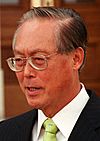 |
Goh Chok Tong (born 1941) MP for Marine Parade GRC |
— | 28 November 1990 |
12 August 2004 |
13 years, 258 days | PAP | Goh I | |
| 1991 | Goh II | ||||||||
| Ong Teng Cheong (1993–1999) |
|||||||||
| 1997 | Goh III | ||||||||
| S. R. Nathan (1999–2011) |
|||||||||
| 2001 | Goh IV | ||||||||
| 3 | 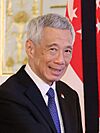 |
Lee Hsien Loong (born 1952) MP for Ang Mo Kio GRC |
— | 12 August 2004 |
15 May 2024 |
19 years, 277 days | PAP | Lee H. I | |
| 2006 | Lee H. II | ||||||||
| 2011 | Lee H. III | ||||||||
| Tony Tan (2011–2017) |
|||||||||
| 2015 | Lee H. IV | ||||||||
| Halimah Yacob (2017–2023) |
|||||||||
| 2020 | Lee H. V | ||||||||
| Tharman Shanmugaratnam (2023–Present) |
|||||||||
| 4 | 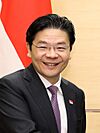 |
Lawrence Wong (born 1972) MP for Marsiling–Yew Tee GRC |
— | 15 May 2024 |
Incumbent | 1 year, 280 days | PAP | Wong I | |
| 2025 | Wong II | ||||||||
Timeline of Prime Ministers

Related Topics
- Prime Minister's Office (PMO)
- Deputy Prime Minister
- Cabinet of Singapore
- Leader of the Opposition
- Politics of Singapore
See also
 In Spanish: Primer ministro de Singapur para niños
In Spanish: Primer ministro de Singapur para niños
 | William L. Dawson |
 | W. E. B. Du Bois |
 | Harry Belafonte |


